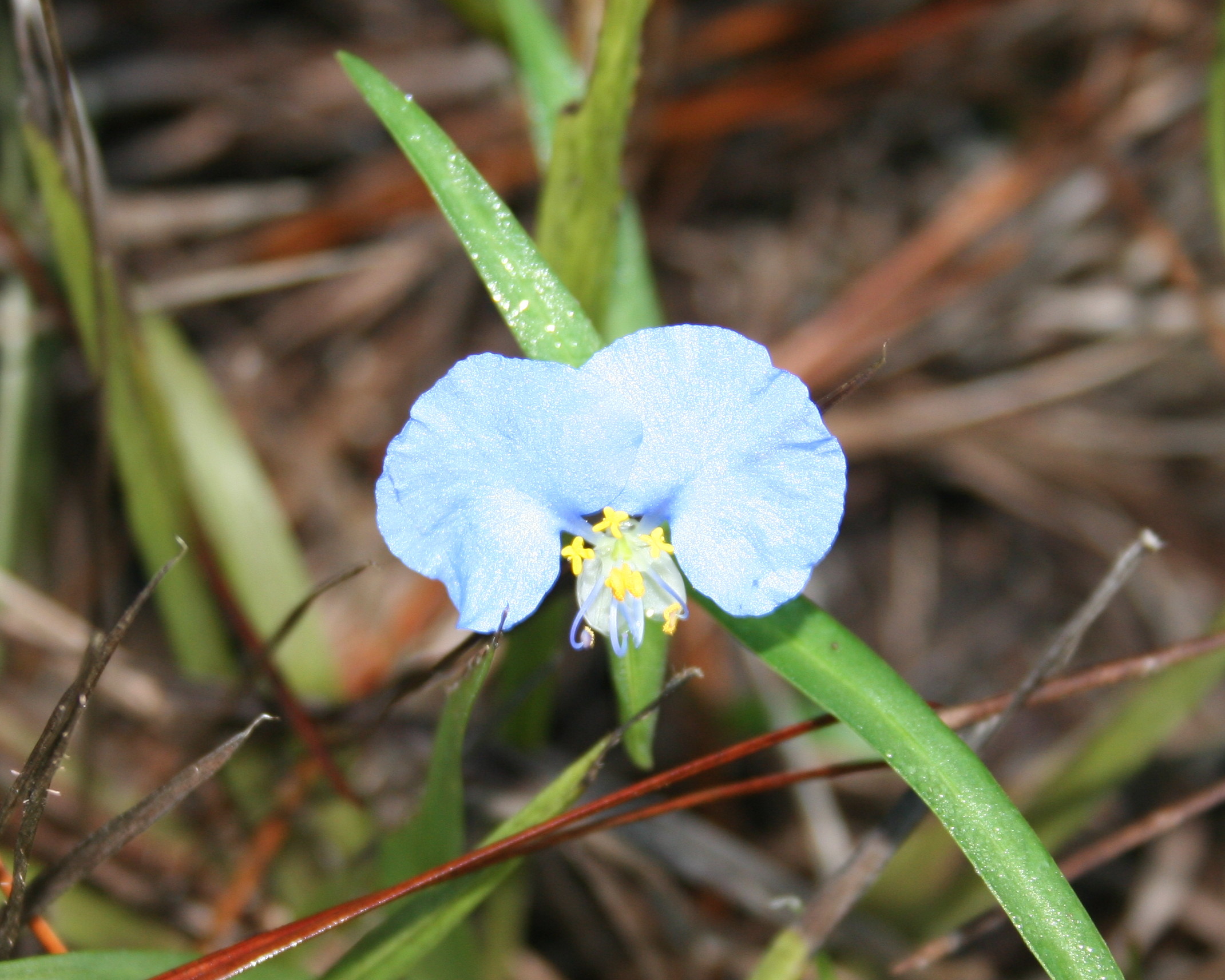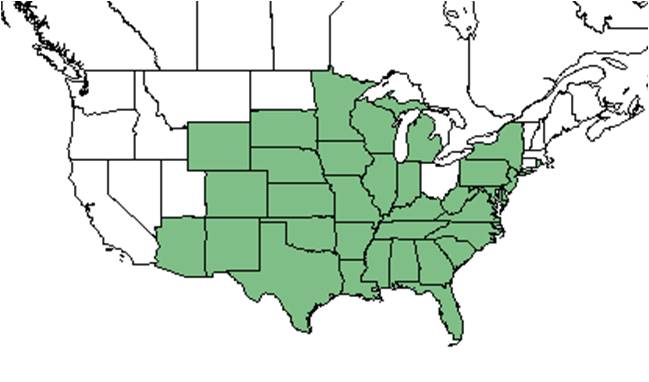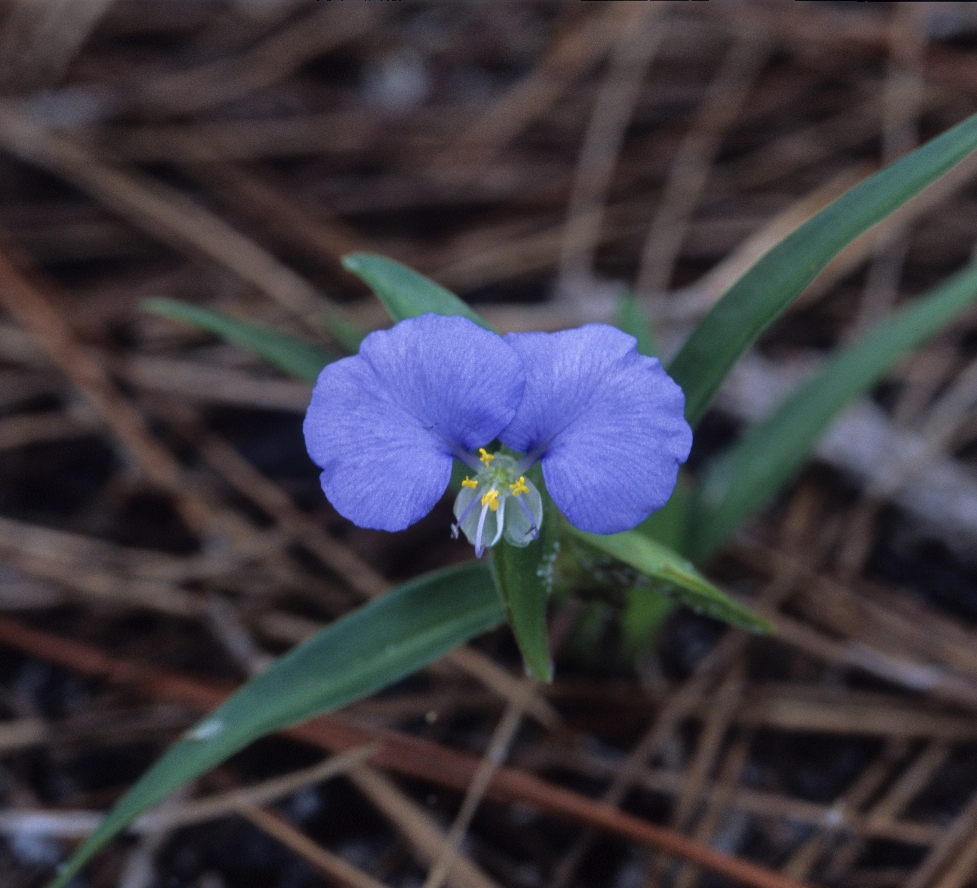Difference between revisions of "Commelina erecta"
(→Conservation and management) |
|||
| Line 32: | Line 32: | ||
==Ecology== | ==Ecology== | ||
===Habitat=== <!--Natural communities, human disturbed habitats, topography, hydrology, soils, light, fire regime requirements for removal of competition, etc.--> | ===Habitat=== <!--Natural communities, human disturbed habitats, topography, hydrology, soils, light, fire regime requirements for removal of competition, etc.--> | ||
| − | In general, this species can grow in a wide range of habitats, including prairies, streambanks, gardens, roadsides, and places of waste.<ref name= "guide"/> ''C. erecta'' var. ''angustifolia'' can be found in sandhills and other sandy dry sites, dunes and sand flats on barrier islands, and shale barrens and other rocky areas. ''C. erecta'' var. ''erecta'' can be found in streambanks, woodlands and dry openings, riverbanks, and mesic forests.<ref name= "Weakley">Weakley, A. S. (2015). Flora of the Southern and Mid-Atlantic States. Chapel Hill, NC, University of North Carolina Herbarium.</ref> Overall, this species can be seen as a dry to mesic species across its wide native range, since it is listed as a facultative, facultative upland, and obligate upland species that can occur in non-wetlands mostly but also wetland communities.<ref name= "USDA"/> It can grow on a variety of soils between sandy and clayey soils.<ref name= "guide"/> | + | In general, this species can grow in a wide range of habitats, including prairies, streambanks, gardens, roadsides, and places of waste.<ref name= "guide"/> ''C. erecta'' var. ''angustifolia'' can be found in sandhills and other sandy dry sites, dunes and sand flats on barrier islands, and shale barrens and other rocky areas. ''C. erecta'' var. ''erecta'' can be found in streambanks, woodlands and dry openings, riverbanks, and mesic forests.<ref name= "Weakley">Weakley, A. S. (2015). Flora of the Southern and Mid-Atlantic States. Chapel Hill, NC, University of North Carolina Herbarium.</ref> Overall, this species can be seen as a dry to mesic species across its wide native range, since it is listed as a facultative, facultative upland, and obligate upland species that can occur in non-wetlands mostly but also wetland communities.<ref name= "USDA"/> ''C. erecta'' has been observed in pine flatwoods, edges of cypress wetlands, along trails, open coastal hammocks, mixed hardwood forests, longleaf pine and scrub sandhill, steep slopes, limestone glades, and exposed lake beds.<ref name= "herbarium">Florida State University Robert K. Godfrey Herbarium database. URL: http://herbarium.bio.fsu.edu. Last accessed: March 2019. Collectors: Loran C. Anderson, Wilson Baker, Alice Bard, D. E. Breedlove, Steve Christman, Richard R. Clinebell II, M. Davis, J. Dwyer, J. Kevin England, Jamie England, Robert K. Godfrey, Dianne Hall, Ann F. Johnson, Ed Keppner, Lisa Keppner, R. Komarek, R. Kral, Robert M. Laughlin, J. R. Martinez, C. H. Mueller, C. Nelson, John B. Nelson, R. A. Norris, William Platt, Cecil R. Slaughter, L. B. Smith, Edwin L. Tyson, and F. Lyle Wynd. States and Counties: Florida: Alachua, Bay, Brevard, Calhoun, Duval, Franklin, Gadsden, Jackson, Jefferson, Lee, Leon, Okaloosa, St Johns, St Lucie, Volusia, Wakulla, and Washington. Alabama: Marengo. Georgia: Thomas. South Carolina: Richland. Texas: Smith.</ref> It can grow on a variety of soils between sandy and clayey soils.<ref name= "guide"/> |
| + | |||
| + | Associated species: ''Bulbostylis'' sp., ''Marsilea'' sp., ''Pinus elliottii'', ''Pinus palustris'', ''Desmodium ochroleucum'', ''Rhynchosia'' sp., ''Ludwigia americana'', ''Lindernia crustacea'', ''Sesbania vesicaria'', ''Quercus stellata'', ''Quercus elliottii'', and ''Aristida beyrichiana''.<ref name= "herbarium"/> | ||
===Phenology=== <!--Timing off flowering, fruiting, seed dispersal, and environmental triggers. Cite PanFlora website if appropriate: http://www.gilnelson.com/PanFlora/ --> | ===Phenology=== <!--Timing off flowering, fruiting, seed dispersal, and environmental triggers. Cite PanFlora website if appropriate: http://www.gilnelson.com/PanFlora/ --> | ||
Revision as of 16:38, 15 April 2019
| Commelina erecta | |
|---|---|

| |
| Photo by Tom Miller, Apalachicola National Forest, FL | |
| Scientific classification | |
| Kingdom: | Plantae |
| Division: | Magnoliophyta - Flowering plants |
| Class: | Liliopsida – Monocotyledons |
| Order: | Commelinales |
| Family: | Commelinaceae |
| Genus: | Commelina |
| Species: | C. erecta |
| Binomial name | |
| Commelina erecta L. | |

| |
| Natural range of Commelina erecta from USDA NRCS Plants Database. | |
Common name: Whitemouth Dayflower; Erect Dayflower; Sand Dayflower
Contents
[hide]Taxonomic notes
Synonyms: Commelina angustifolia Michaux; C. crispa Wooton; C. elegans Kunth The Flora of North America.
Varieties: C. erecta Linnaeus var. angustifolia (Michaux) Fernald; C. erecta Linnaeus var. erecta
Description
A description of Commelina erecta is provided in The Flora of North America. In Collier County, FL, an albino form was observed.[1] C. erecta var. angustifolia is a trailing plant that can have stems reach as long as 1.3 meters.[2] As a member of the Commelinaceae family, the genus name Commelina is named after the three Commelin brothers who were Dutch botanists, and this plant's two conspicuous petals are said to stand for the two brothers who were published while the third petal that is inconspicuous is said to respresent the unpublished Commelin brother.[3]
Distribution
C. erecta var. angustifolia is distributed from east North Carolina to south Florida, as well as Texas, Iowa, northwest Nebraska, New Mexico, and Colorado. However, C. erecta var. erecta is distributed from Pennsylvania to Missouri and east Kansas to Florida and Texas.[2]
Ecology
Habitat
In general, this species can grow in a wide range of habitats, including prairies, streambanks, gardens, roadsides, and places of waste.[3] C. erecta var. angustifolia can be found in sandhills and other sandy dry sites, dunes and sand flats on barrier islands, and shale barrens and other rocky areas. C. erecta var. erecta can be found in streambanks, woodlands and dry openings, riverbanks, and mesic forests.[2] Overall, this species can be seen as a dry to mesic species across its wide native range, since it is listed as a facultative, facultative upland, and obligate upland species that can occur in non-wetlands mostly but also wetland communities.[4] C. erecta has been observed in pine flatwoods, edges of cypress wetlands, along trails, open coastal hammocks, mixed hardwood forests, longleaf pine and scrub sandhill, steep slopes, limestone glades, and exposed lake beds.[5] It can grow on a variety of soils between sandy and clayey soils.[3]
Associated species: Bulbostylis sp., Marsilea sp., Pinus elliottii, Pinus palustris, Desmodium ochroleucum, Rhynchosia sp., Ludwigia americana, Lindernia crustacea, Sesbania vesicaria, Quercus stellata, Quercus elliottii, and Aristida beyrichiana.[5]
Phenology
C. erecta has been observed flowering from May to November with peak inflorescence in June and July.[6][2] In repeated annual censuses conducted in October in permanently marked plots in native longleaf pine-wiregrass communities in southern Georgia, C. erecta appeared only in certain years, seemingly in particularly wet years, and was fairly common in the years that it appeared.[7] While each individual flower only blooms for a day, there are several buds on the plant that flower between 3 and 4 days apart from one another.[8]
Seed dispersal
This species is thought to be dispersed by gravity. [9]
Seed bank and germination
In a greenhouse germination study, a success of 87% was found with twelve hours of daylight with temperatures between 75 and 85 degrees Fahrenheit and twelve hours of darkness with temperatures between 50 and 60 degrees Fahrenheit.[3]
Pollination
In Daytona Beach, FL, the pollen-feeding bee fly (Poecilognathus punctipennis) was observed visiting C. erecta[10] and performing their unique foraging behavior.[11] The following Hymenoptera families and species were observed visiting flowers of Commelina erecta at Archbold Biological Station:[12]
Halictidae: Augochlorella aurata, Augochloropsis metallica, A. sumptuosa, Lasioglossum nymphalis, L. placidensis
Megachilidae: Megachile brevis pseudobrevis
Use by animals
C. erecta consists of approximately 10-25% of the diet for large mammals, and 5-10% of the diet for terrestrial birds.[13] It is a preferred source of food for white-tailed deer, it is grazed by cattle, and the seeds are eaten by bobwhite quail, white-winged doves, and mourning doves.[3]
Conservation and management
This species is listed as endangered by the New Jersey Department of Environmental Protection and Energy, as threatened by the Iowa Department of Natural Resources, as extirpated by the Pennsylvania Department of Conservation and Natural Resources, and as probably extirpated by the Michigan Department of Natural Resources.[4] However, since the plant is weedy, it has the potential to become invasive in some areas.[8]
Cultivation and restoration
Photo Gallery
References and notes
- Jump up ↑ Observation by Roger Hammer in CREW Marsh, Collier County, FL, May 23, 2017, posted to Florida Flora and Ecosystematics Facebook Group May 23, 2017.
- ↑ Jump up to: 2.0 2.1 2.2 2.3 Weakley, A. S. (2015). Flora of the Southern and Mid-Atlantic States. Chapel Hill, NC, University of North Carolina Herbarium.
- ↑ Jump up to: 3.0 3.1 3.2 3.3 3.4 Lloyd-Reilley, J. and E. Kadin. (2006). Plant Guide: Erect Dayflower Commelina erecta. N.R.C.S. United States Department of Agriculture. Kingsville, TX.
- ↑ Jump up to: 4.0 4.1 USDA, NRCS. (2016). The PLANTS Database (http://plants.usda.gov, 15 April 2019). National Plant Data Team, Greensboro, NC 27401-4901 USA.
- ↑ Jump up to: 5.0 5.1 Florida State University Robert K. Godfrey Herbarium database. URL: http://herbarium.bio.fsu.edu. Last accessed: March 2019. Collectors: Loran C. Anderson, Wilson Baker, Alice Bard, D. E. Breedlove, Steve Christman, Richard R. Clinebell II, M. Davis, J. Dwyer, J. Kevin England, Jamie England, Robert K. Godfrey, Dianne Hall, Ann F. Johnson, Ed Keppner, Lisa Keppner, R. Komarek, R. Kral, Robert M. Laughlin, J. R. Martinez, C. H. Mueller, C. Nelson, John B. Nelson, R. A. Norris, William Platt, Cecil R. Slaughter, L. B. Smith, Edwin L. Tyson, and F. Lyle Wynd. States and Counties: Florida: Alachua, Bay, Brevard, Calhoun, Duval, Franklin, Gadsden, Jackson, Jefferson, Lee, Leon, Okaloosa, St Johns, St Lucie, Volusia, Wakulla, and Washington. Alabama: Marengo. Georgia: Thomas. South Carolina: Richland. Texas: Smith.
- Jump up ↑ Nelson, G. PanFlora: Plant data for the eastern United States with emphasis on the Southeastern Coastal Plains, Florida, and the Florida Panhandle. www.gilnelson.com/PanFlora/ Accessed: 7 DEC 2016
- Jump up ↑ Robertson, K.M. 2017 Pebble Hill Fire Plots database. Tall Timbers Research, Inc., Tallahassee, Florida.
- ↑ Jump up to: 8.0 8.1 [[1]] Lady Bird Johnson Wildflower Center. Accessed: April 15, 2019
- Jump up ↑ Kirkman, L. Katherine. Unpublished database of seed dispersal mode of plants found in Coastal Plain longleaf pine-grasslands of the Jones Ecological Research Center, Georgia.
- Jump up ↑ Observation by Peter May in Tiger Bay State Forest, Daytona Beach, FL, May 23, 2017, posted to Florida Flora and Ecosystematics Facebook Group May 23, 2017.
- Jump up ↑ Deyrup MA (1988) Pollen-feeding in Poecilognathus punctipennis (Diptera: Bombyliidae). The Florida Entomologist 71(4):597-605.
- Jump up ↑ Deyrup, M.A. and N.D. 2015. Database of observations of Hymenoptera visitations to flowers of plants on Archbold Biological Station, Florida, USA.
- Jump up ↑ Everitt, J.H., D.L. Drawe, and R.I. Lonard. 1999. Field guide to the broad leaved herbaceous plants of South Texas used by livestock and wildlife. Texas Tech University Press. Lubbock.
